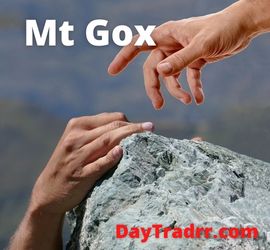What Was Mt. Gox?
 Mt. Gox was a cryptocurrency exchange located in Tokyo, Japan, that operated from 2010 until 2014. At its height, it accounted for more than 70% of all Bitcoin transactions. Although it is most frequently referred to as Mt. Gox, the exchange is also known as MtGox or Mt Gox. The exchange declared bankruptcy in 2014 but continues to be the subject of lawsuits and rumors.
Mt. Gox was a cryptocurrency exchange located in Tokyo, Japan, that operated from 2010 until 2014. At its height, it accounted for more than 70% of all Bitcoin transactions. Although it is most frequently referred to as Mt. Gox, the exchange is also known as MtGox or Mt Gox. The exchange declared bankruptcy in 2014 but continues to be the subject of lawsuits and rumors.
At the time in 2010, there were few options for buying and selling bitcoin, and the exchange grew fast. It got too big for McCaleb, who sold it to Mark Karpelès. Mt. Gox handled an estimated 70 percent of all bitcoin transactions going into 2014, but the site’s rise was never smooth. It suffered hacks, outages, a run-in with the US government, and a $75 million lawsuit. In early 2014, customers started to complain that they had requested withdrawals from Mt. Gox but never received the money. Then, the site shut off all withdrawals. Its Twitter account disappeared. Behind the scenes, Karpelès had discovered that an attacker had slowly been draining all of Mt. Gox’s bitcoins without being noticed. The company filed for bankruptcy in February 2014, citing $64 million in liabilities.
Mt. Gox Early History
Jed McCaleb built the website that evolved into the Mt. Gox exchange. It started off as a mechanism for fans of the card game “Magic: The Gathering” to exchange cards online. Mt. Gox was formed as an abbreviation for “Magic: The Gathering Online Exchange.” In 2011, the site was transferred to Mark Karpeles in return for six months of earnings. Karpeles rose to become the company’s largest shareholder and CEO. At its peak, Mt. Gox was the world’s largest Bitcoin exchange. It handled between 70% and 80% of the trade volume. Because it handled so many transactions, Mt. Gox played a disproportionate influence in deciding Bitcoin’s market activity. For example, in 2013, it halted trading for several days to allow the market to calm down.
McCaleb told Reuters in an interview that he wanted to work on other projects and transferred the exchange to Karpeles in February 2011. The only conditions were that Karpeles had to share the exchange’s revenues with McCaleb for six months, not hold him legally responsible for any problems and give him a 12 percent stake. Mt. Gox became part of Tibanne, which Karpeles had formed in 2009 as a web hosting and development business. He named the company after his cat. Karpeles said when he took over Mt. Gox, it had about 3,000 customers. As bitcoin grew in popularity among tech aficionados and investors, the exchange prospered. By 2013, it had nearly 1.1 million active accounts from 239 countries. As a result, it handled upwards of 90 percent of global bitcoin trading. It generated about $40 million in fees in its last year according to Karpeles. (Source: reuters.com)
What Happened to Mt. Gox?
Mt. Gox had security issues multiple times during its operation. Because of its notoriety in the Bitcoin market, it became a target for hackers. In 2011, hackers transferred Bitcoins using stolen passwords. That same year, flaws in network protocols resulted in the “loss” of several thousand Bitcoins. Customers indicated rising irritation with withdrawal issues in the months running up to February 2014. Technical glitches kept the corporation from having a strong handle on transaction data. In particular, there was the ambiguity of whether Bitcoins had been sent to clients’ digital wallets.
Bitcoin Transaction Malleability
This problem was allegedly caused by a fault in the Bitcoin program. It supposedly allowed users to change transaction IDs, a phenomenon known as “transaction malleability.” The community has challenged this claim, but an agreement was reached in late 2021, so the matter appears to be resolved. In February 2014, the exchange took a deadly blow. The exchange banned withdrawals in early February 2014, claiming to have discovered suspicious behavior in its digital wallets. The corporation realized it had “lost” hundreds of thousands of Bitcoins. The number of coins reported missing ranged from 650,000 to 850,000. While 200,000 Bitcoins were eventually retrieved, the lost cryptocurrency severely destabilized the market. The worth of Bitcoins was believed to be in the hundreds of millions, forcing Mt. Gox to declare bankruptcy. In April 2014, it filed for bankruptcy in the Tokyo District Court and was ordered to liquidate.
More than 200,000 Bitcoin and Bitcoin Cash were held by the estate in which Mt. Gox’s assets were put. Mt. Gox trustee Nobuaki Kobayashi extended the deadline for submitting claims to March 31, 2020. There was conjecture that Russian hackers were responsible for the theft and that some of the stolen Bitcoins may be recovered. CoinLab, a major creditor of Mt. Gox, has continued to pursue its multibillion-dollar breach of contract action against the company. Mark Karpeles, the CEO of Mt. Gox, was found guilty of manipulating data in order to inflate holdings in 2019.
The Future of Mt. Gox
Mr. Kobayashi, the trustee for Mt. Gox, issued an announcement in November 2021. This was after Japanese courts and Mt. Gox creditors achieved an agreement on the Mt. Gox rehabilitation plan. The rehabilitation plan sets a registration and compensation strategy for various creditors based on stages. Approved rehabilitation creditors with creditor codes can use the MT. Gox Online Rehabilitation Claim Filing System to register. Unfortunately, new rehabilitation claims cannot be made using this approach. The Tokyo District Court referred the rehabilitation draft to a resolution in February 2021. In effect, closing the process and prohibiting any new claims from being filed. It remains to be seen if Mt. Gox has a future in cryptocurrencies. What is clear is that a chapter in the history of cryptocurrencies has now been closed.
Frequently Asked Questions
Is Mt Gox an Isolated Case?
Mt. Gox was neither the first nor last exchange to experience a big heist. 120,000 bitcoins worth $72 million were stolen from the Hong Kong exchange Bitfinex in 2016. In January, 500 million NEM tokens worth $400 million were stolen from Japan-based Coincheck. Further, Mt. Gox isn’t the only exchange to declare bankruptcy. Youbit, located in South Korea, did so in December 2017. This was after a hacker stole a fifth of its holdings. Since 2011, more than 980,000 bitcoins have been stolen from exchanges, with Mt. Gox accounting for two-thirds of the total. According to Reuters, the total value of the stolen coins today is more than $6 billion. Mt. Gox is one of the few failed exchanges that ended up in bankruptcy court. Others just disappeared.
What Happened to the Mt Gox Bitcoins?
Only about 200,000 were ever recovered. The rest are lost or removed from the network.
How Many Bitcoins Did Mt Gox Lose?
Reports range from 650,000 to 850,000, some of which belonged to the company and the rest to customers.
Is Mt Gox Still Active?
Mt. Gox closed its website and filed for bankruptcy in 2014. Whether there will be an attempt at a reopening remains to be seen.
Up Next: What Is the Shapley Value?
 The Shapley value is a concept drawn from cooperative game theory. It is used to assign a value to a player’s participation which corresponds to the eventual result of the game. Assigning value includes equitably allocating both advantages and costs among the numerous individuals in a coalition. When two or more players or components are involved in a strategy to obtain a desired outcome or payout, this is referred to as game theory.
The Shapley value is a concept drawn from cooperative game theory. It is used to assign a value to a player’s participation which corresponds to the eventual result of the game. Assigning value includes equitably allocating both advantages and costs among the numerous individuals in a coalition. When two or more players or components are involved in a strategy to obtain a desired outcome or payout, this is referred to as game theory.
The Shapley value is most applicable when the contributions of each actor are uneven. Yet, each person works together in cooperation to achieve the gain or payout. The Shapley value assures that each actor gets as much as or more than they would if they were acting on their own. The value obtained is crucial since there is no motivation for actors to interact otherwise. The Shapley value, named after Lloyd Shapley, has a wide range of applications, including business, machine learning, and internet marketing. For his efforts and contribution, Lloyd Shapley won the Nobel Prize in Economics in 2012




